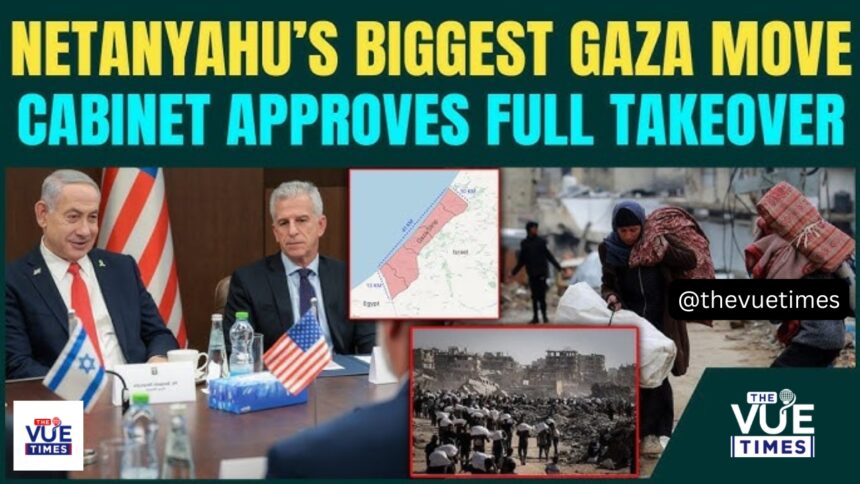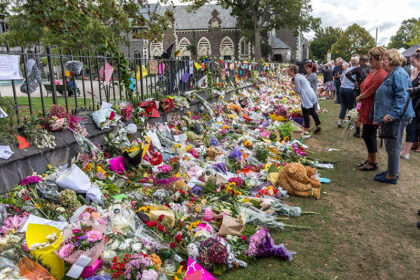A Decision That Signals Escalation
At the beginning of August 8, 2025, a meeting of the Security Cabinet of Israel voted to go forward with an operation by Prime Minister Benjamin Netanyahu to seize the city of Gaza, the largest urban center still not fully controlled by Israeli military rule. The move is a drastic upsurge in a conflict that has already been dragging on for almost two years with the people of Gaza experiencing unprecedented humanitarian destruction.
This was approved following several hours of behind-the-scenes deliberations during which the top-most military officials together with political figures and heads of intelligence were discussing the tactical as well as strategic and political risks involved in doing so. Following the talks, Netanyahu came out victorious proclaiming that the annexation of Gaza City was the key to annihilating Hamas and guaranteeing the long-term security of Israel.

Netanyahu’s Strategy: Total Control, Temporary Occupation
Hours before the meeting of the Cabinet, Netanyahu told Fox News about his greater vision: complete Israeli control of the military in the Gaza Strip then handed over to that managed by friends, the Arab forces who run the Gaza strip without jeopardizing Israeli security.
Netanyahu said: “We have plans and we are set to overtake the entire Gaza to finish Hamas and give the people an opportunity to live without fear. We do not want to keep it but want some security perimeter prior to its transfer.”
Albeit as a contingency measure, this plan puts a question mark on the way the government will be organized without Hamas in the picture, and without reviving the Palestinian Authority, something Netanyahu supporters in the far-right have zero intention of doing.
Historical Context: How Gaza Reached This Point
In order to realize the scale of this decision, it is necessary to consider the causes of the current conflict once again. On October 7, 2023, militants who employed Hamas-led coordinated assault eliminated approximately 1,200 people and took 251 hostages in southern Israel. The attack that rocked Israel to the core caused an immense fireback attack- one that has now turned into a long siege and ground offensive over the entire Gaza.
By the middle of 2025, Israel had already occupied about three-quarters of the land, together with the main part of northern and central Gaza. But Gaza City, which was a densely populated place, strategically important, and symbolically significant was partially out of complete Israeli control. Its capture would not only hit the core of the political and logistical system of Hamas but also, perhaps more importantly, send a message to both the domestic and international community, that Israel will not stop this war until it achieves the mentioned goals.
The Military Dimension: Tactical Gains vs. Strategic Risks
According to the Israeli Defense Forces (IDF) Gaza City becomes a major node to the remaining Hamas activities. According to intelligence reports, it is still home to command bunkers, a series of tunnels, and weapons dumps. Whether to launch a full-scale occupation is, however, not unanimously favored within the top brass of Israel.
The IDF Chief of Staff, Lt. Gen. Eyal Zamir, allegedly cautioned the Cabinet members that such an operation may put at risk the lives of the some 20 hostages who are still presumed to be alive in Gaza. Moreover, the IDF is already over-extended with sustained operations in Rafah, Khan Younis, and the central corridor that require considerable human resource and logistics.
Security chiefs who served in the top ranks in earlier decades, of whom some led large campaigns in Gaza, have warned that a long sustained occupation carries with it the risk of dragging Israel into a costly quagmire; one in which paper military success does not bring about political sustainability.

Humanitarian Fallout: Gaza on the Brink
The humanitarian crisis in Gaza is already critical. The Health Ministry run by Hamas made the claim that more than 61,000 Palestinians had been killed since the war began, which have been deemed trustworthy by the United Nations and other independent monitors despite the disputes on the part of Israel. Most of the population of Gaza, 2 million people, have been forced out of their homes, many reside in improvised camps with little or no access to clean water, medical services, and nutritious food.
International aid organizations have raised an alarm of probable outbreak of mass death of non combatants, not only due to direct armed conflict but also due to mass starvation and epidemics in case of the siege of Gaza City. The UN Office for the Coordination of Humanitarian Affairs
OCHA has raised reports of the killing or injury of civilians trying to access food aid which is rising. There are incidents where scenes of out-of-control populations around humanitarian convoys have led to fatalities.
Domestic Dissent: Hostage Families and Anti-War Voices
This decision of the Cabinet has widened rifts within Israel itself. On the premises where the Cabinet meeting was held in Jerusalem, families of hostages demonstrated, with accusations that Netanyahu put party survival first before the successful rescue of their loved ones. As far as one even went to sea, sailing to the maritime border with Gaza yelling through megaphones to Hamas, asking them to free captives.
Yehuda Cohen, whose son is an Israeli soldier being held in Gaza, attacked the prime minister for acting solely to ensure his own best interests and appeasing the hardliners of his coalition. Far-right ministers have publicly advocated the mass deportation of Gaza residents to third world countries and the redifferentiation of Jewish colonies destroyed in the course of Israel 2005 withdrawal operation into the territory.
International Reaction: Isolation and Warning
Even though the United States has continued its conventional backing on the right of Israel to self-defense, even Washington has shown concern over the humanitarian costs involved. In other countries, this has been explicit:
- Australia cautioned that international law could be breached in case of a military occupation of Gaza and urged the immediate ceasefire so as to deliver aid. ● European Union representatives repeated their demand for a two-state solution and urged Israel to stop activity that would leave future negotiations unattainable.
- The concept of taking control of Gaza under the existing circumstances has been opposed by the regional Arab governments like Egypt and Jordan since they find the idea unviable politically without the agreement of the Palestinians.
Should Israel move forward with the conquest of Gaza City, it will strain major partners further and will be left in an even worse position of isolation.

What Comes Next: Possible Scenarios
The accepted plan will most probably follow in phases:
- Blockade of Gaza City- The encirclement of Gaza city is likely to intensify by Israeli military creating a closed-door to remaining supply routes.
- Targeted Attacks and Ground Entry- Slow infiltration of special forces and mechanized forces which would attack major Hamas infrastructure.
- Administrative Vacuum: After Hamas is taken out, there is an uncertainty of who will take control. The concept of the so-called friendly Arab forces introduced by Netanyahu is as ambiguous as are the actual promises of the region.
- International Oversight Debate: Commentators see the prospect of pressure into a United Nations or Arab League mediated transitional government.
Analytical Insight: The Balance Between Security and Sustainability
Realizing the military objective, entering Gaza City would provide Israel with a symbolic and tactical triumph. But the trick is how to handle the aftermath. A ruined city with non-functioning governance is a threat to turn into fertile soil of new insurgency.
To achieve any permanent solution, Israel will have to supplement its security aims with a plausible political and humanitarian approach. This includes:
- Implementing humanitarian corridors that are guarded internationally. ● Involving the regional actors in serious post-conflict rebuilding planning. ● Entering into negotiations, albeit minimal, with regard to a political system where the Palestinian rights and ambitions will be considered.
Overall, in the absence of such measures, the Gaza City takeover might be soon considered another expensive dot in a continuation of violence, where there will be no clear line of demarcation.
A Turning Point with Global Implications
And it is a tactical military decision which Israel is de facto conducting, involving the conquest of Gaza City itself, which is not just about tactics, the movement in Gaza City is rather a defining moment in a battle which has already changed the geopolitical landscape in the Middle Eastern region. It will be a matter of choices in upcoming weeks whether it brings a definitive end to the Hamas reign or further complicates an issue that is already never-ending.
To the Gaza population, the short term future holds even greater travails. In the case of Israel, this test will be to show that security and humanity can coexist in policy rather than rhetoric. And to the international community, this is a test of its desire to be not just a commentator of history, but of helping to write history.










